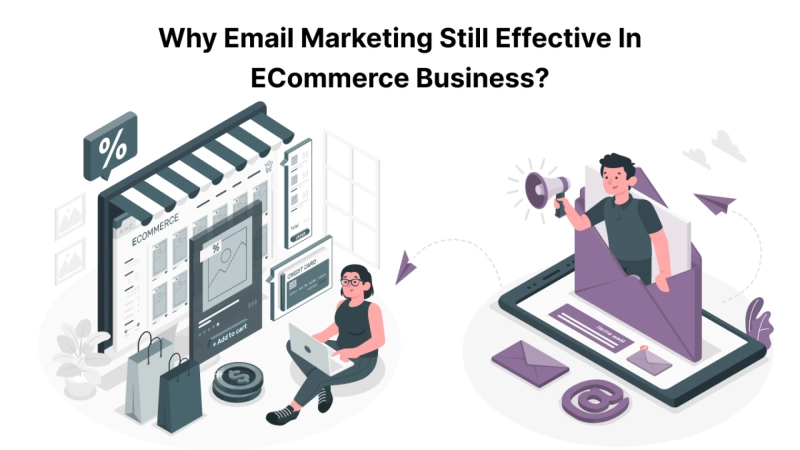In the age of social media algorithms and ever-changing consumer preferences, some might question the continued relevance of email marketing for ecommerce businesses.
However, email marketing remains a powerful tool, offering exceptional return on investment (ROI) and fostering deeper customer relationships.
Here\'s why email marketing should be a cornerstone of your ecommerce marketing strategy:
Highly Targeted Communication:
Unlike social media, where organic reach is declining, email allows you to directly connect with a curated audience who has already expressed interest in your brand.
By segmenting your email list based on demographics, purchase history, or browsing behavior, you can send targeted emails with personalized content that resonates with specific customer groups.
Measurable Results and Optimization:
Email marketing platforms provide valuable data and analytics, allowing you to track key metrics like open rates, click-through rates, and conversion rates. This data offers actionable insights into what\'s working and what needs improvement.
You can A/B test different subject lines, email layouts, and content offers to continuously refine your strategy and maximize your ROI.
Cost-Effective Marketing Channel:
Compared to traditional marketing methods like print advertising or television commercials, email marketing offers a significantly lower cost of entry.
Building and maintaining an email list requires minimal investment.
Most email marketing platforms offer tiered pricing plans based on the number of subscribers, allowing you to scale your campaigns as your business grows.
Fosters Customer Loyalty and Builds Relationships:
Effective email marketing goes beyond just promoting products. It\'s an opportunity to nurture leads, educate customers, and build trust with your brand.
By sending informative content, exclusive offers, and personalized recommendations, you can establish yourself as a thought leader and a valuable resource for your target audience. This fosters customer loyalty and encourages repeat business.
Boosts Brand Awareness and Recognition:
Regularly sending engaging emails keeps your brand top-of-mind with your customers. Even if they\'re not actively browsing your website at the moment, seeing your brand name in their inbox can trigger recall and remind them of your products or services.
This consistent brand exposure fosters brand recognition and increases the likelihood of customers choosing you when they\'re ready to make a purchase.
Integrates Seamlessly with Other Marketing Channels:
Email marketing works best when combined with other marketing strategies.
Leverage social media channels to promote your email signup forms, use email to promote exclusive discounts or early access to new product launches, and even incorporate email automation for abandoned carts or post-purchase follow-ups.
This multi-channel approach creates a cohesive brand experience and maximizes the impact of your marketing efforts.
Adaptability and Personalization:
Email marketing campaigns can be easily adapted to cater to special occasions, holidays, or trending topics.
You can personalize email greetings with customer names, incorporate birthday discounts or anniversary promotions, and even tailor product recommendations based on past purchase history.
Building a Successful Email Marketing Strategy for Ecommerce:
Grow Your Email List Organically:
Offer valuable incentives like e-books, discounts, or early access to new products in exchange for email addresses. Always obtain explicit opt-in consent to comply with regulations like GDPR and CAN-SPAM. When a new customer is sign-up your eCommerce store, then make sure you take their email address and store it securely.
Segmentation is Key:
Prioritizing the segmentation in the email marketing is offering the valuable insights to create a successful and possible strategy. Don\'t blast generic emails to your entire list. Segment your audience based on relevant criteria and tailor content for each group.
Craft Compelling Subject Lines:
Subject lines are the first impression, so keep them concise, informative, and intriguing. Use strong verbs and create a sense of urgency to encourage recipients to open your email. Choosing the helpful, useful, and reliable subject lines work as the boarding pass where customers can easily check in to your store.
Prioritize Mobile-Friendly Design:
A significant portion of emails are opened on mobile devices. Ensure your emails are responsive and render well across different screen sizes. With a mobile-friendly design email templates, you can reach a wider range of audiences and optimize it for a better conversion rates.
Focus on Value, Not Just Sales:
Don\'t bombard subscribers with constant promotional emails. Provide valuable content that educates, entertains, or solves problems for your audience. Give the proper information in the email and motivate them to accomplish the goal like purchase or contact the business.
Personalize Your Emails:
Go beyond just names. Use segmentation data to tailor content, product recommendations, and offers to individual preferences. With a personalized emails, you can reach the customer\'s minds and allows them to interact with you and communicate further. You can recommend the best products according to their past purchase.
Calls to Action (CTAs):
Tell your audience what you want them to do! Include clear CTAs that encourage engagement, such as visiting your website, making a purchase, or subscribing to a service. With CTAs you email templates work as the invitation that enables customers to make a desired actions like purchase, book a slot for appointment, download eBook or attend a webinar.
Track and Analyze Your Results:
Regularly monitor key metrics and optimize your campaigns based on data insights. This will help you to make a further decision on the email marketing strategy development and if required you can invest time and money on it, if it\'s beneficial.
Conclusion:
Email marketing remains a powerful tool for ecommerce businesses of all sizes. It offers a cost-effective way to reach a targeted audience, foster customer relationships, and drive sales.
By implementing the strategies outlined above, you can create a successful email marketing campaign that propels your ecommerce business forward. Remember, email marketing is a marathon, not a sprint race.


